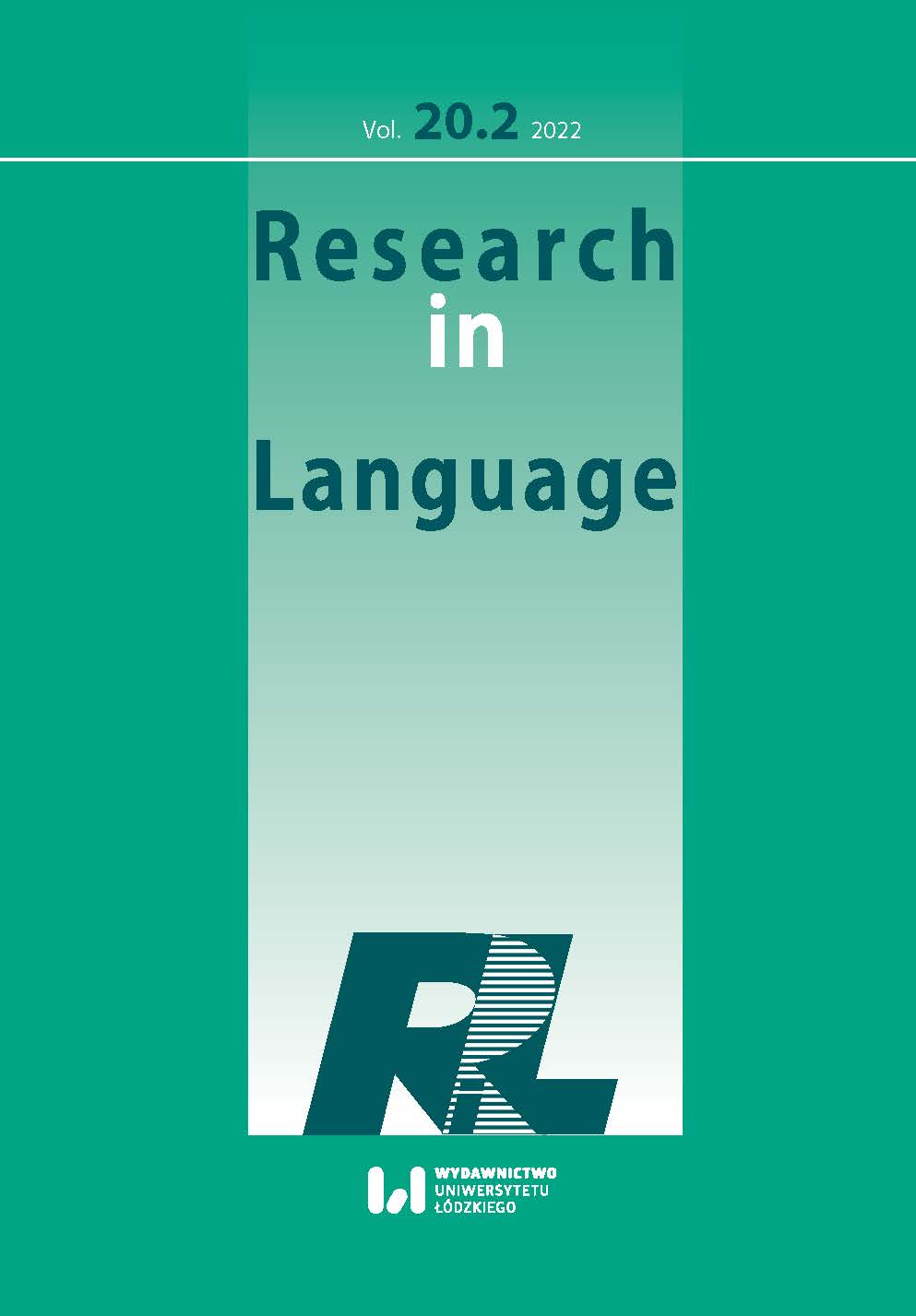Student-Teacher Conferences in an English Pronunciation Course: Goals, Characteristics and Views
DOI:
https://doi.org/10.18778/1731-7533.20.2.01Keywords:
student-teacher conferences, pronunciation instruction, ESL, EFL, individualized instructionAbstract
Student-teacher conferences are considered an effective pedagogical tool for individualized writing instruction. Yet, little is known about the goals, characteristics and perceptions of student-teacher conferences for individualized English as a second language (ESL) pronunciation instruction. This article presents an exploratory study on student and instructor perceptions of mandatory student-teacher conferences in a semester-long ESL pronunciation course. Data were gathered from 24 college ESL students and five experienced ESL instructors via pre-/post-instruction read-aloud tests, four questionnaires and a focus group discussion. The results indicated pronunciation improvement during the course and participants’ overall satisfaction with the learning outcomes, goals, format and characteristics of the conferences. Participants’ views on benefits, drawbacks, and recommendations for these one-on-one meetings revealed valuable insights for pronunciation instructors.
References
Baran-Łucarz, Małgorzata. 2022. Language Anxiety. In T. M. Derwing, M. J. Munro, and R. I. Thomson (eds.), Routledge Handbook of Second Language Acquisition and Speaking, 83-96. Routledge.
Google Scholar
DOI: https://doi.org/10.4324/9781003022497-8
Brown, Adam. 1988. Functional Load and the Teaching of Pronunciation. TESOL Quarterly, 22(4), 593-606. https://doi.org/10.2307/3587258
Google Scholar
DOI: https://doi.org/10.2307/3587258
Carnicelli, Thomas A. 1980. The Writing Conferences: A One-on-One Conversation. In T. R. Donovan and B. W. McClelland (eds.), Eight Approaches to Teaching Composition, 101–132. Urbana, IL: National Council of Teachers of English.
Google Scholar
Creswell, John W., and J. David Creswell. 2018. Research Design: Qualitative, Quantitative, and Mixed Methods Approaches. 5th ed. Thousand Oaks, CA: Sage.
Google Scholar
Dickerson, Wayne B. 2013. Prediction in Teaching Pronunciation. In C. A. Chapelle (ed.), The Encyclopedia of Applied Linguistics, 1–7. Hoboken, NJ: Blackwell Publishing. https://doi.org/10.1002/9781405198431.wbeal0950
Google Scholar
DOI: https://doi.org/10.1002/9781405198431.wbeal0950
Dickerson, Wayne B. 2015. Using Orthography to Teach Pronunciation. In M. Reed and J. M. Levis (eds.), The Handbook of English Pronunciation, 488-504. West Sussex, UK: John Wiley and Sons, Inc. https://doi.org/10.1002/9781118346952.ch27
Google Scholar
DOI: https://doi.org/10.1002/9781118346952.ch27
Eckstein, Grant. 2013. Implementing and Evaluating a Writing Conference Program for International L2 Writers Across Language Proficiency Levels. Journal of Second Language Writing. 22(3), 231-239. https://doi.org/10.1016/j.jslw.2013.03.001
Google Scholar
DOI: https://doi.org/10.1016/j.jslw.2013.03.001
Hahn, Laura, and Wayne B. Dickerson. 1999. Speechcraft: Discourse Pronunciation for Advanced Learners. Ann Arbor: University of Michigan Press.
Google Scholar
DOI: https://doi.org/10.3998/mpub.8396
Keh, Claudia L. 1990. Feedback in the Writing Process: A Model and Methods for Implementation. ELT Journal, 44(4), 294-304. https://doi.org/10.1093/elt/44.4.294
Google Scholar
DOI: https://doi.org/10.1093/elt/44.4.294
Maliborska, Veronika, and Yunjung You. 2016. Writing Conferences in a Second Language Writing Classroom: Instructor and Student Perspectives. TESOL Journal, 7(4), 874-897. https://doi.org/10.1002/tesj.249
Google Scholar
DOI: https://doi.org/10.1002/tesj.249
Mora, Joan C. 2022. Aptitude and Individual Differences. In In T. M. Derwing, M. J. Munro, and R. I. Thomson (eds.), Routledge Handbook of Second Language Acquisition and Speaking, 68-82. Routledge.
Google Scholar
DOI: https://doi.org/10.4324/9781003022497-7
Sardegna, Veronica G. 2012. Learner Differences in Strategy Use, Self-Efficacy Beliefs, and Pronunciation Improvement. In J. Levis and K. LeVelle (eds.), Proceedings of the Pronunciation in Second Language Learning and Teaching Conference, Sept. 16–17, 2011, 39–53. Iowa State University.
Google Scholar
Sardegna, Veronica G. 2020. Pronunciation and Good Language Teachers. In C. Griffiths and Z. Tajeddin (eds.), Lessons from Good Language Teachers, 232–245. Cambridge University Press. https://doi.org/10.1017/9781108774390.021
Google Scholar
DOI: https://doi.org/10.1017/9781108774390.021
Sardegna, Veronica G. 2022. Evidence in Favor of a Strategy-Based Model for English Pronunciation Instruction. Language Teaching, 55(3), 363-378. https://doi.org/10.1017/S0261444821000380
Google Scholar
DOI: https://doi.org/10.1017/S0261444821000380
Sardegna, Veronica G., Chiang, Fu-Hao, and Mimi Ghosh. 2016. Integrating Pronunciation with Presentation Skills. In T. Jones (ed.), Pronunciation in the Classroom: The Overlooked Essential, 43–56. TESOL Press.
Google Scholar
Sardegna, Veronica G., and Anna Jarosz. 2022. Exploring How YouGlish Supports Learning English Word Stress: A Perception Study. In V. G. Sardegna and A. Jarosz (eds.), Theoretical and Practical Developments in English Speech Assessment, Research, and Training: Studies in honour of Ewa Waniek-Klimczak, 165–184. Springer. https://doi.org/10.1007/978-3-030-98218-8_10
Google Scholar
DOI: https://doi.org/10.1007/978-3-030-98218-8_10
Sardegna, Veronica G., Lee, Juhee., and Crystal Kusey. 2018. Self-efficacy, Attitudes, and Choice of Strategies for English Pronunciation Learning. Language Learning, 68(1), 83–114. https://doi.org/10.1111/lang.12263
Google Scholar
DOI: https://doi.org/10.1111/lang.12263
Sardegna, Veronica G., and Alison McGregor. 2013. Scaffolding Students’ Self-Regulated Efforts for Effective Pronunciation Practice. In J. Levis and K. LeVelle (eds.), Proceedings of the Pronunciation in Second Language Learning and Teaching Conference, Aug. 24-25, 2012, 182–193. Iowa State University.
Google Scholar
Sardegna, Veronica G., and Alison McGregor. 2022. Classroom Research for Pronunciation. In J. M. Levis, T. M. Derwing, and S. Sonsaat-Hegelheimer (eds.), Second Language Pronunciation: Bridging the Gap between Research and Teaching, 107–128. Wiley.
Google Scholar
Sowell, Jimalee. 2020. Let’s be Direct: Making the Student-Teacher Writing Conference work for multilingual writers. MEXTESOL Journal, 44(4), 1-8. https://www.mextesol.net/journal/index.php?page=journalandid_article=21838
Google Scholar
Thomas, David R. 2006. A General Inductive Approach for Analyzing Qualitative Evaluation Data. American Journal of Evaluation, 27, 2, 237–246. https://doi.org/10.1177/1098214005283748
Google Scholar
DOI: https://doi.org/10.1177/1098214005283748
Yang, Luxin. 2022. Focus and Interaction in Writing Conferences for EFL Writers. SAGE Open, 12(1), 1-13. https://doi.org/10.1177/21582440211058200
Google Scholar
DOI: https://doi.org/10.1177/21582440211058200
Yeh, Chun-Chun. 2016. EFL College Students’ Experiences and Attitudes Towards Teacher-Student Writing Conferences. Journal of Response to Writing, 2(3), 36-65. https://scholarsarchive.byu.edu/journalrw/vol2/iss2/3
Google Scholar
Young, Richard F., and Elizabeth R. Miller. 2004. Learning as Changing Participation: Discourse roles in ESL Writing Conference. The Modern Language Journal, 88 (4), 519-535. https://doi.org/10.1111/j.0026-7902.2004.t01-16-.x
Google Scholar
DOI: https://doi.org/10.1111/j.0026-7902.2004.t01-16-.x
Walker, C. P., and Elias, D. 1987. Writing Conference Talk: Factors Associated with High-and Low-Rated Writing Conferences. Research in the Teaching of English, 21(3), 266-285. https://www.jstor.org/stable/40171115
Google Scholar
Wu, Chia P., and Huey J. Lin. 2015. Examining the Effects of Conferencing and Reflection Paper in an EFL Writing Class. International Journal of English and Education, 4(1), 289-298.
Google Scholar
Downloads
Published
How to Cite
Issue
Section
License

This work is licensed under a Creative Commons Attribution-NonCommercial-NoDerivatives 4.0 International License.










